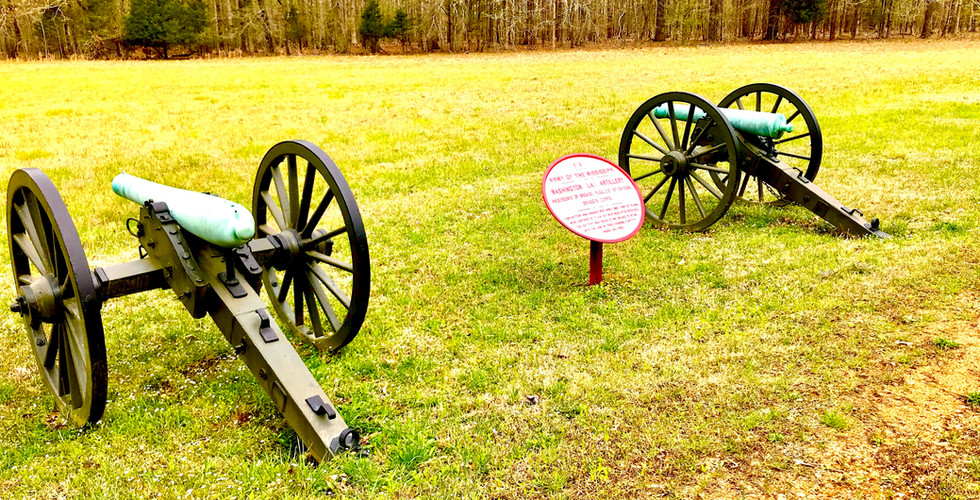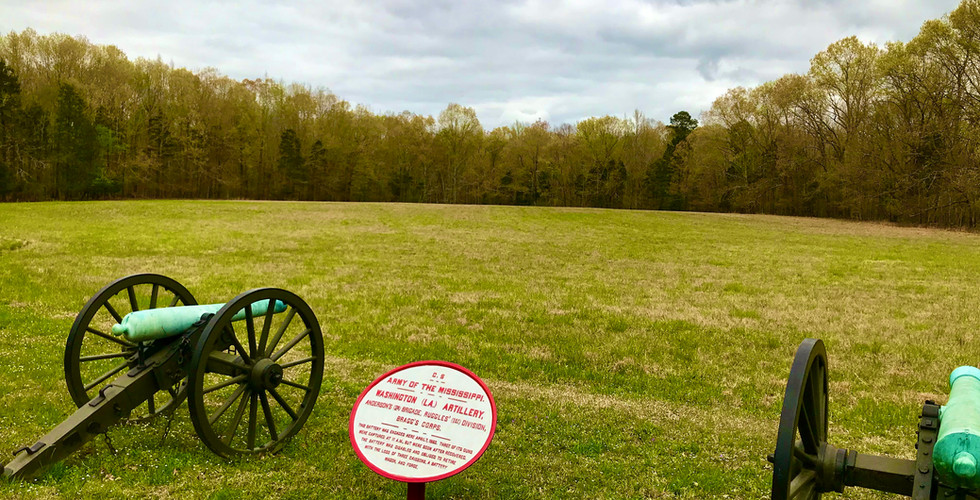The Washington Artillery at the Battle of Shiloh
- Derrick Lindow
- Oct 22, 2020
- 8 min read
Updated: Dec 6, 2022

One of the most interesting units in the Confederate western armies is the 5th Company of the Washington Artillery of New Orleans. This elite battery was present at every major engagement fought by the Army of Mississippi/Tennessee. Last year (2019), I was fortunate enough to portray a cannoneer in the battery during the Missionary Ridge event for three days. So now, I really have a strong interest in the men that made up one of the most famed units of the war.
The Washington Artillery was a prewar militia unit in New Orleans, and when the war began in 1861 its four companies were sent east to the Virginia seat of war. A fifth company was raised by W. Irving Hodgson, with the intention that it too would eventually be sent east. However, as the fortunes of Confederate arms crumbled in the west in early 1862, all available organized units were called north to join A.S. Johnston and P.G.T. Beauregard in Grand Junction, Tennessee and then Corinth, Mississippi. The Confederate order of battle above the brigade level for the Battle of Shiloh is nearly useless, as units routinely found themselves mixed with other units from completely different divisions or corps. The terrain at Shiloh played a part in this, but so did the plan of attack drawn up by Beauregard's chief of staff, Thomas Jordan. With the three corps stacked on top of each other, the mingling of units was inevitable, and the experiences of the Washington Artillery at Shiloh are typical of other batteries.
Below, I have posted the report of Captain W. Irving Hodgson, commander of the 5th Company, on the Battle of Shiloh. He led the battery from its inception until June 1862, when he resigned due to supposed ill health. Sean Michael Chick writes in his excellent post at Emerging Civil War, that Hodgson's performance at Shiloh was suspect, and possibly borderlines on cowardice. I will let the reader decide on that, as I have not read everything there is Hodgson. However, it is interesting that when he tried to return to the battery, the men did not allow it to happen. So check out his report for yourself, compare it to other sources, and make your own judgement!

Hdqrs. Fifth Co., Batt. Washington Artillery, Camp Moore, Corinth, Miss., April 9,1862.
General : In accordance with usage I hereby report to you the action of my battery in the battle of the 6th and 7th instant:
My battery, consisting of two 6-pounder smooth-bore guns, two 6-pounder rifled guns, and two 12-pounder howitzers; total, six pieces, fully equipped with ammunition, horses, and men, entered the field just in the rear of the Twentieth Louisiana Regiment (the right regiment of your brigade) on Sunday morning, the 6th instant, on the hill overlooking, from the southwest, the encampment of the enemy immediately in front of it and to the northeast, being the first camp attacked and taken by our army.

At 7.10 a. m. we opened fire on their camp with our full battery of six guns, firing shell and spherical case-shot, soon silencing one of their batteries and filling the enemy with consternation. After firing some 40 rounds thus we were directed by General Ruggles to shell a camp immediately upon the left of the one just mentioned, and in which there was a battery from which the shot and shell were thrown on all sides of us. With two howitzers and two rifled guns, under Lieutenants Slocomb and Yaught, assisted by two pieces from Captain Shoup’s battery, we soon silenced their guns, and had the extreme gratification of seeing our brave and gallant troops charge through these two camps, running the enemy before them at the point of the bayonet. At this point I lost your command, and on the order of General Ruggles to go wherever I heard the most firing, I passed over the first camp captured through a third, and on to a fourth, in which your troops were doing sad havoc to the enemy. I formed in battery on your extreme left, in the avenue of the camp, and commenced firing with canister from four guns into the tents of the enemy, only some 50 yards off. It was at this point I suffered most (Location shown below). The skirmishers of the enemy, lying in their tents only a stone's throw from us, cut holes through their tents near the ground, and with u white powder,77 or some preparation which discharged their arms without report, played a deadly fire in among my cannoneers, killing 3 men, wounding 7 or 8, besides killing some of my most valuable horses, mine among the rest. As soon as we were well formed in battery and got well to work we saw them creeping from their tents and making for the woods, and immediately afterwards saw your column charge the whole of them in ambush and put them to flight.

A visit through that portion of their camp at a subsequent hour satisfied me, from the number of the dead and the nature of their wounds, that my battery had done its duty. Losing you again at this point, on account of the heavy brushwood through which you charged, 1 was requested by General Trudeau [He probably meant Colonel Robert Trabue commanding the 1st Kentucky Brigade, which as in the area.] to plant two guns farther down the avenue, say about 200 yards off, to shell a fifth camp farther on, which I did, and after firing a dozen or more shells had the satisfaction of seeing the cavalry charge the camp, putting the enemy to flight, killing many and capturing many wounded prisoners. Being again without a commanding general, and not knowing your exact position, I received and executed orders from General Hardee, and his aide, Colonel Kearney, also from Colonel Chisolm, of General Beauregard’s staff, and in fact from other aides, whose names I do not know, going to points threatened and exposed and where firing was continued, rendering cheerfully all the assistance I could with my battery, now reduced in men and horses, all fatigued and hungry.
At about 2 p. m., at the instance of General Hardee, I opened from the fifth camp we had entered fire upon a sixth camp, due north, silencing a battery and driving the enemy from their tents. Said portion of the army of the enemy was charged and their battery captured; afterwards lost again by the Guard Orleans and other troops on our left, under Col. Preston Pond, jr. This was about the last firing of my battery on the 6th instant. Taking the main road to Pittsburg Landing we followed on the heels of our men after a retreating and badly-whipped army until within three-fourths of a mile of the Tennessee River, when the enemy began to shell the woods from their gunboats. General Ruggles ordered us back to the enemy’s camp, where we bivouacked for the night.

I received orders on the morning of the 7th, at about 5.30 o’clock, to follow your command with my battery, and at 6 o’clock, being ready to move, could not ascertain your position, so took position on the extreme right of our army, supported by the Crescent Regiment, of Colonel Pond’s brigade, in our rear, and an Arkansas regiment on my front, and I think the Twenty-first Tennessee Regiment on my left flank, all under General Hardee, or, in fact, he seemed to be the master spirit, giving all orders and seeing that they were properly executed.
At about 9 o’clock General Breckinridge’s command, on our extreme front, had pushed the enemy up and on to within several hundred yards of our front, when we opened fire with shot and shell with our full battery. After firing some 70 rounds we took position farther on, just on the edge of the open space ahead, and with a full battery, assisted by two pieces of MeClung’s battery, we poured some 60 rounds into the enemy, who continued to advance upon us until within some 20 yards of us, when Col. Marshall J. Smith, of the Crescent Regiment, gallantly came to our rescue, charging the enemy at the point of the bayonet, putting them to flight, and saving our three extreme right pieces, which would have been captured but for them. It was at this point I again met with severe losses; Lieutenant Slocomb, Sergeant Green, several privates, and many horses fell at this point, either killed or badly wounded.


After the enemy had retreated well into the woods I had my guns limbered and taken from the field. My men broken down, my horses nearly all slain, ammunition out, and sponges all broken and gone, I was in the act of making repairs and preparing for another attack, when I was ordered by General Beauregard to retire in order to Monterey, which I did that evening, and afterward to this point, arriving last evening with my battery all complete, with the exception of three caissons, a battery wagon, and forge, which I had to abandon on the road for want of fresh horses to draw them in.
At the request of General Beauregard I detailed from my command 12 men, under a non-commissioned officer, to remain and act with Captain Byrne’s battery on a prominent hill on the Pea Ridge road, overlooking the battle-field, to cover the retirement of our army. They all came in to-day safe and sound.
We captured two stands of United States colors, which were handed over to General Beauregard; we also captured several United States horses and mules, some of which we have now, others we have lost. I cannot close this report without again calling to your favorable notice the names of my lieutenants—Slocomb, Vaught, and Chalaron—for their coolness and bravery on the field was daring and gallant, and worthy your consideration.
I have the honor to be, yours, very truly,
W. IRVING HODGSON,
Captain.
***
Hdqrs. 5th Co., Batt. Washington Artillery, Camp Moore, Corinth, Miss., April 11, 1862.
Captain: I herewith tender to you a supplementary report in regard to matters connected with the battle of the 6th and 7th, instant:
My battery fired during said actions, from the six guns, 723 rounds, mostly from the smooth-bore guns and howitzers, a large proportion of which w ere canister, some of our ammunition chests being repacked from a captured caisson and other canister borrowed from Captain Robertson’s battery, which he kindly loaned. The badly-torn wheels and carriages of my battery from Minie balls will convince any one of the close proximity to the enemy in which we were. I had 28 horses slain in the battle, exclusive of officers’ horses.
I cannot refrain from applauding to you the gallant actions of Sergeants Bartley, Blair, and Smith; Corporals O’Brien, Higgins, Davidson, Beggs, Spearing, and Holmes; also of Privates Boyden, Duggan, Murphy, Bayne, Leckie, Shotwell, Jones, Salter, Mathis, Scott, Fahnestock, Levy, Tomlin, Johnson, Seixas, Wing, and Hartnett; all of whom, with the young men killed, were at their post during the action and behaved most gallantly. Many of them, for the first time under fire, conducted themselves as veterans.
I have the honor to be, yours, very truly,
W. IRVING HODGSON,
Captain.
***
Hdqrs. 5th Co., Batt. Washington Artillery, Camp Moore, Corinth, Miss., April 12, 1862.
Captain : Referring to my reports of the battle of the 6th and 7th instant under dates of the 9th and 11th instant, I have had conversations with the chiefs of sections of my battery on the subject, and ascertain that there are so many of the rank and file that behaved gallantly on those occasions it would make too long a list and be too invidious to mention names. You will, therefore, please erase those portions of my reports which refer to that subject, beginning with A. Gordon Bakewell and ending with Privates Wing and Hartnett.
By so doing you will much oblige, yours, very truly,
W. IRVING HODGSON,
Captain
***
Captain Hodgson reports losing 28 horses, though Ed Bearss records the battery lost 30 in his Shiloh Artillery Study. They do agree, however, on the amount of ammunition expended, 723 rounds. The amount of ammunition used in the engagement averages out to about 120 rounds per gun, though it should be noted, that not all guns in a battery are firing at the same time, or at the same rate of fire. As the battery had three different types of guns, they would have been used for different situations, and once a gun's equipment was lost or destroyed, the gun itself would undoubtedly become unserviceable for want of proper implements, as Hodgson reported for the portion of the fight on April 7th.
If you would like more info on the Washington Artillery, consider visiting this SITE, which is devoted to the overall history of the organization.
Derrick Lindow is an author, historian, teacher, and creator of the WTCW site. His first book, published by Savas Beatie, will be released in Spring 2023. Go HERE to read more posts by Derrick and HERE to visit his personal page. Follow Derrick on different social media platforms (Instagram and Twitter) to get more Western Theater and Kentucky Civil War Content.












Comments